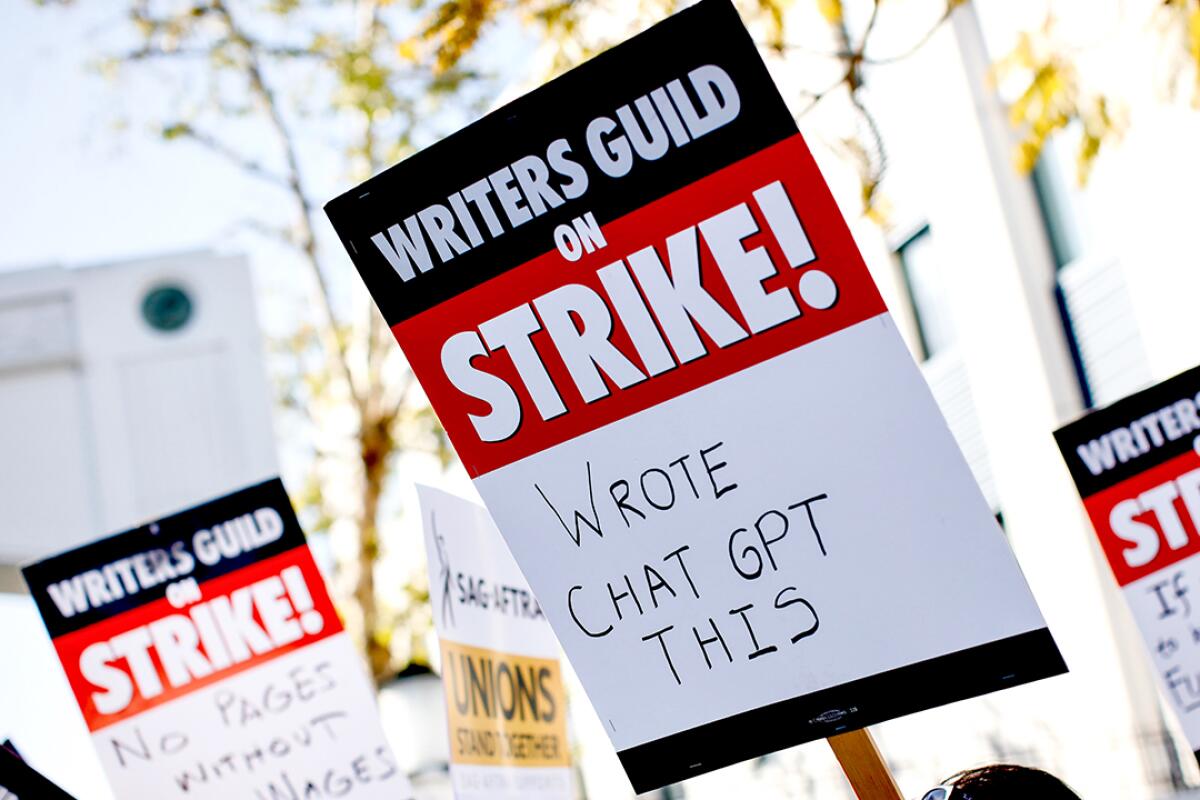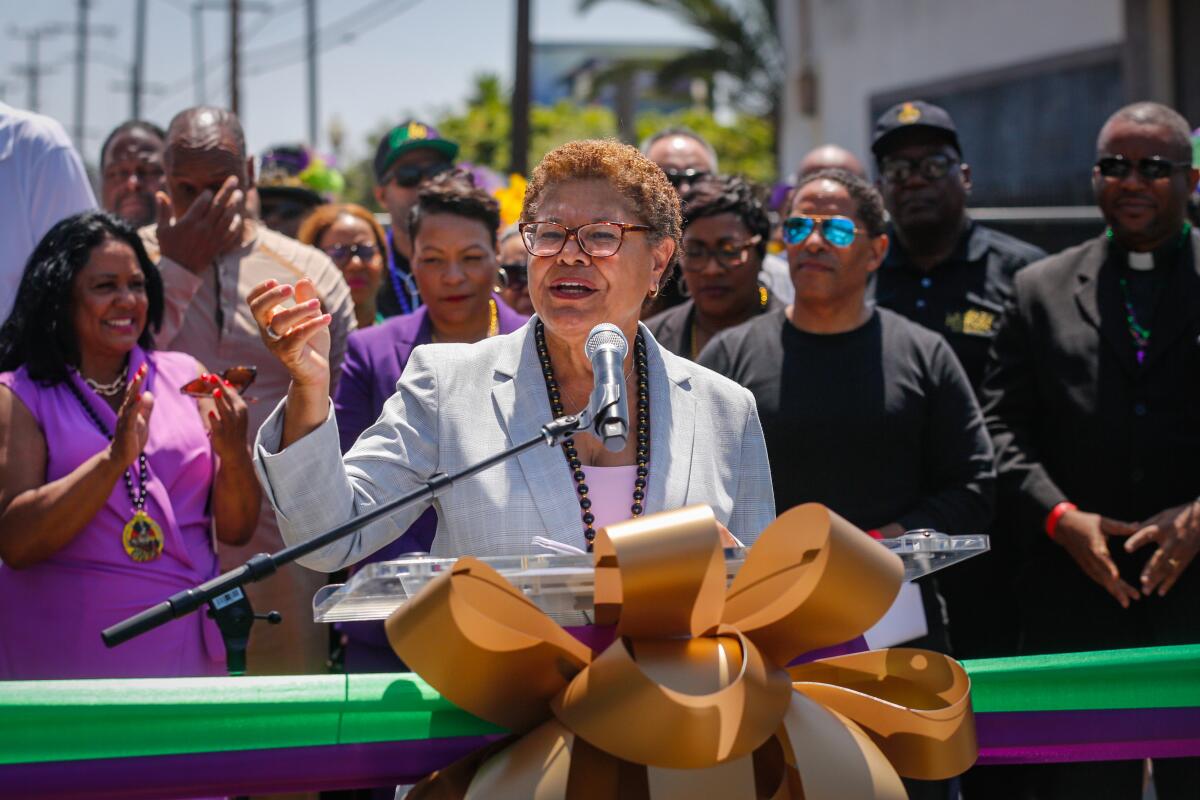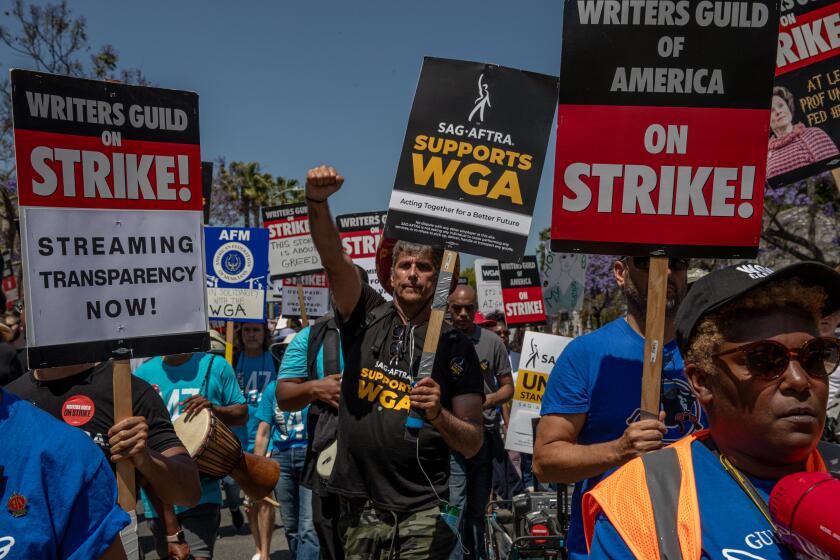News Analysis: Mayor Karen Bass still a background actor in Hollywood’s labor standoff

- Share via
With Hollywood’s double strike soon to enter its third full week and no hint of rapprochement on the horizon, talk is increasingly turning to what role — if any — Los Angeles Mayor Karen Bass could play in resolving the disputes and getting thousands of actors, writers and others back to work.
This is the first time unions representing Hollywood writers and actors have staged simultaneous walkouts since 1960. The fallout has dealt a brutal blow to an industry still limping out of a pandemic and struggling to reset in the age of streaming.
Screenwriters went on strike May 2 and SAG-AFTRA, the 160,000-member performers union, joined the picket lines in mid-July, freezing what little scripted production was left and painfully upping the citywide economic ante.
The cast of Hollywood’s hot labor summer has been rife with villain roles and star-making soliloquies. But a hero capable of leading the guilds and studios out of acrimony valley and toward a happy ending has yet to emerge.
Hollywood is once again in the midst of a historic labor battle in which studios are facing a possible strike on two fronts in a protracted fight over new forms of distribution.
In that leadership vacuum, some have speculated that Bass could play conciliator. In an industry known for its egos, the mayor’s decidedly unflashy style could be a boon, and she has long been known as a coalition builder.
But as of now, the general consensus seems to be that she remains a background actor in Hollywood’s current drama.
Bass said last week that she has been “in discussion with members of the WGA who have told me about their working conditions, as well as studio executives to talk about the economic conditions and the changes within the industry,” but declined to comment further about her role.
The mayor has met with with members of the Writers Guild of America and Screen Actors Guild-American Federation of Television and Radio Artists as well as studio representatives and continues “to engage with labor leaders, studio heads, elected leaders and other impacted parties,” her spokesperson Zach Seidl said Thursday.
Several prominent Hollywood figures from different corners of the industry said they had not heard about the mayor stepping into the quagmire in any meaningful way, at least as of yet.
Representatives for the WGA, SAG-AFTRA and the Alliance of Motion Picture and Television Producers either declined to comment or did not respond to requests for comment.
It’s not uncommon for big-city mayors to get involved, and sometimes even mediate, in labor disputes that have a broad impact on the local economy.
Four months ago, Bass helped broker a deal between the Los Angeles Unified School District and the union representing school support staff, preventing further campus closures and drawing effusive praise from both sides. Former Mayor Eric Garcetti took on a similar role during the 2019 teachers’ strike.
But Hollywood labor discord has historically been handled in-house, with little influence or assistance from Los Angeles City Hall.
In 2007, then-Mayor Antonio Villaraigosa’s offers to mediate near the start of the last writers’ strike were rebuffed by the Alliance of Motion Picture and Television Producers. Writers and producers also worked out their differences during the 1988 writers’ strike without the involvement of then-Mayor Tom Bradley.
A burgeoning economic crisis with pain radiating from the region’s best-known industry is of obvious concern to a city’s chief executive. But Bass, who has been laser-focused on homelessness since taking office, also finds herself in a fraught position.
Despite the deeply felt impacts on her city, Bass has no authority over the situation or specific levers to pull, beyond the bully pulpit of her office. Unlike with the school strike, the employers here are largely multinational corporations. And several of the major studios are not even located within city limits.

Other politicians, including members of Congress, state legislators and quite a few City Council representatives, have been a frequent presence on the picket lines, giving their full-throated support to the striking actors and writers. Bass has taken some flak, particularly online, for not taking a similar stand.
“The mayor has heard from both sides that what is most helpful to arrive at a fair and equitable solution is for her to remain in a position where she can convene all involved when the time comes,” Seidl said, seemingly alluding to a potential mediator role down the line.
One could also argue that there is little political upside for Bass publicly inserting herself during a moment of relative paralysis.
Both sides remain deeply divided on key issues, such as AI technology and residuals on streaming platforms, and there’s no clear indication of when talks will resume with either guild. The dog days of summer are also a historically dead time in Hollywood, when power brokers take lengthy vacations and the pace of deal-making stalls.
“The challenge is that mayors will likely weigh in when they have a pretty good sense that their intervention will yield significant results,” UCLA Labor Center Director Kent Wong said.
“If you have a situation where there is a huge gap between what the employer is offering versus what the union is asking for, then it makes it very difficult for the mayor to come in to create miracles.”
As a former six-term Los Angeles congresswoman, she certainly has deep relationships in Hollywood, but it’s also unclear how close she is with any of the current guild or studio leadership.
Disney Chief Executive Bob Iger and Warner Bros. Discovery CEO David Zaslav were invited to her inaugural State of the City address in April, though neither attended. (Zaslav gave $1,500 to Bass’ mayoral campaign; Iger donated to neither of the two candidates in the race.)
During her 2022 campaign, financial support came from all sides of the entertainment industry.
Get the lowdown on L.A. politics
Sign up for our L.A. City Hall newsletter to get weekly insights, scoops and analysis.
You may occasionally receive promotional content from the Los Angeles Times.
Jeffrey Katzenberg, the Dreamworks SKG co-founder and former chairman of Walt Disney Studios, was by far the biggest financial supporter of Bass, pouring in about $1.85 million to an independent committee supporting her campaign. That committee also received $125,000 from Netflix co-founder and Executive Chairman Reed Hastings’ wife, Patty Quillin.
Film and TV writers and actors collectively gave about $200,000 directly to Bass’ campaign, according to campaign finance records. Many also used their platforms to boost her candidacy, headlining events and amplifying her talking points on social media.
Gov. Gavin Newsom, who also has deep political and personal connections to actors, writers and studio executives, has toed a similar line to Bass’ in recent weeks, though he has offered to step in to negotiate an end to the standoff.
“He’s willing to help if both sides want it. At this point that’s not where we are,” said Anthony York, a spokesperson for Newsom. “That being said, of course he has concerns about the impact of a prolonged stalemate on the local and the state economy because of the tens of thousands of people who rely on the entertainment industry for their livelihood.”
The governor and his top staff continue to have conversations with industry players on all sides, his office said.
Times staff writer Taryn Luna in Sacramento contributed to this report.
More to Read
Sign up for Essential California
The most important California stories and recommendations in your inbox every morning.
You may occasionally receive promotional content from the Los Angeles Times.















